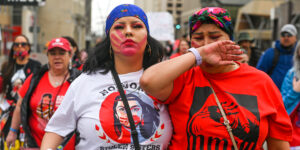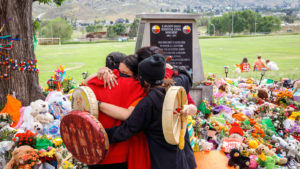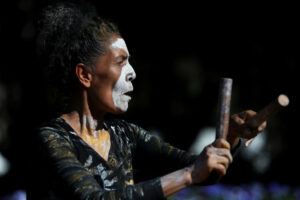On election night two years ago, at a celebration packed with ecstatic Labor Party faithful, an emotional Anthony Albanese rose for his victory speech. “I begin by acknowledging the traditional owners of the land on which we meet,” he said. “And on behalf of the Australian Labor Party, I commit to the Uluru Statement from the Heart in full.”
The statement’s first leg, the acknowledgement of country, has become a ritualised opening of proceedings; meaningful on occasions such as this one was, self-congratulatory tokenism when, say, four white dudes on Zoom are about to haggle over property leases.
The second leg, however, the wholehearted commitment to the Uluru Statement from the Heart, made a number of us true believers quietly wince. First because the outer-suburban punters who swing elections in Australia, and had just ended nine years of conservative rule, were given an immediate cue to tune out. Second, because Albo’s vow trailed danger in its wake. He had forgotten the golden rule of politics: never promise that which is not in your power to deliver.
The Uluru Statement from the Heart is a moving declaration forged by more than 250 Aboriginal and Torres Strait Islander leaders in Central Australia, at the foot of the mighty rock, in May 2017. At its centre is a call for constitutional recognition in the form of an indigenous Voice to parliament, an advisory body similar to those that successfully advocate for the Sami people in Scandinavian countries. It is a proposed tweaking of process in the hope of doing better on the substance of tackling entrenched disadvantage in indigenous communities.
True to his word, Albanese made the Voice a first-term priority, such that on Saturday, Australians will vote “Yes” or “No” in a referendum on the proposed constitutional amendment. If the polls are correct, a reform Albanese touts as a “generous” offer for indigenous Australia will fail. (When has the assurance, “this is a very generous offer”, ever sealed a deal?)
For months, activists have warned that a No victory will be Australia’s “Brexit moment”, a warning that inadvertently reveals their elitism. To be invested in the nation’s global reputation makes you by definition a cosmopolitan “anywhere”, and as with Brexit, it’s the reflexively patriotic “somewheres” who need to be convinced the Voice is in the national interest and by extension in theirs.
That task was always going to be tough because the electoral hurdle is steep — only eight of 44 referendums have passed since federation in 1901 — and voters are innately conservative about fiddling with Australia’s constitution. Plus, past referendums tell us that failure is all but guaranteed when the proposal does not enjoy bi-partisan support, which is the case here. Which was always going to be the case here. The leader of Australia’s Opposition Liberal party, Peter Dutton, has his default setting at total war. His one job, executed superbly, was to sow fear and doubt.
Whatever happens today, we’ll look back on the referendum debate as another dreary episode in an age of political polarisation and media fragmentation. It starred a Trumpian-influenced Right, a take-no-hostages Left, and a progressive centre that struggles to win an argument, the muscle weakened from disuse by the inhibiting impact of identity politics and “no-debate” wokeism.
There’s a Yes poster on display on my balcony, courtesy of my teenage daughter. I’ll likewise be voting Yes tomorrow, persuaded the case for outweighs the most legitimate of the arguments against. The poster reads as follows:
Say Yes!
Recognition
Listening
Better Results
Presumably, the word association is a wink to a specific enlightened audience assumed capable of joining the dots to a coherent argument. “Better results” — for whom, exactly? And for crying out loud why “Say Yes!” rather than “Vote Yes!”? Unless your priority is policing speech rather than getting a referendum over the line.
By contrast, the slogan of the opposing camp — “If you don’t know, vote No”— is brilliantly capacious. A straightforward reading recalls the No case’s early critique that the Prime Minister was treating the public “like mugs” for failing to provide details on how the Voice would work. But the phrase can accommodate myriad other doubts, from fears about unforeseen legal implications, or new layers of bureaucracy, to cynicism that the Voice will produce better outcomes for indigenous Australians.
Reportedly, the most persuasive argument for No is that the Voice will entrench division and “re-racialise” the country. There is, perhaps, a sliver of principle here: prominent indigenous campaigners for No claim that the Voice will be hijacked by “Canberra elites” to the detriment of First Nations elders on traditional lands. Yet to many, the argument is a dog whistle that ignores the fact that — from incarceration rates to life expectancy — Australia is already “racially” divided now and will likely remain so without a circuit breaker.
The argument is also booby-trapped, demanding of Yes advocates the humiliating self-restraint not to take the bait and accuse their opponents of racism, not to further alienate the people they need to convince by insinuating, à la Hillary Clinton, that they’re a “basket of deplorables”. The distinguished Yes advocate, indigenous leader Marcia Langton, was engulfed in a firestorm of criticism last month for claiming many of the No camp’s arguments were rooted in “base racism”.
Yet it should not have been Langton’s responsibility to stay on message. Arguably, the one voice we needed to hear above all others was that of the person staking his reputation on the referendum: the prime minister. But Albanese essentially outsourced the campaign to an amorphous outfit called “Yes23”, and to indigenous leaders, gaining moral legitimacy but losing an aura of control that’s especially necessary when trying to reassure voters that if the Voice calls for, say, reparations, the government will say no.
Meanwhile, No bolstered its case by being headlined by three powerful indigenous figures. The three have very different motivations for opposing the Voice and speak to different groups in Australia. The first, senator Lidia Thorpe, spoke for the “Progressive No” blak sovereign movement that regards the Voice, in the absence of a formal treaty, as a fatal concession to whitefella law. While the progressive No vote is likely negligible, the fact of its existence reinforced the perception — the accuracy of which is contestible — that the indigenous community is itself ambivalent about the reform. And the existence of Progressive No was constantly reinforced in Thorpe’s volatile persona; in one of several stunts she threw herself on the ground at Sydney’s Gay and Lesbian Mardi Gras Parade to protest the presence of a police float.
The conservative Noes comprise Warren Mundine, an intriguing veteran of party politics — he’s operated at high levels in both major parties — and who has also backed a treaty. But the rock star is Jacinta Nampijinpa Price, in her own provocative description, “a Warlpiri-Celtic woman”. A conservative senator from the Northern Territory, Price’s blunt talk and counter-cultural appeal has seen her touted as a future prime minister. During a public address last month, Price said that on the whole European settlement was a good thing because now her people had running water. She denied there were any ongoing impacts from colonisation on indigenous Australians, including inter-generational trauma.
While such sentiments are clearly a-historical — how could there not be lingering trauma from the forcible removal of Aboriginal children from their families, an assimilationist state policy that only stopped in the Seventies? — they drew attention to the Left’s taboo on questioning any aspect of the dominant narrative about the indigenous underclass, and crucially, gave the public permission to doubt. Or, if you prefer, she offered absolution for white guilt. How to solve a problem like Price? Dismiss her as an Aunty Tom — and then in the same breath lament the unleashing of racist tropes?
What’s frustrating is that the arguments in favour of the Voice are inherently mainstream, even conservative — but the Yes camp has failed to hammer them home. The indigenous elders most prominently associated with the Voice have long rejected the politics of victimhood and noble savage myths about traditional culture pre-colonisation. Langton, who I mentioned earlier, has criticised bureaucratic squeamishness about tackling gendered violence in remote communities. Noel Pearson, leader of the far-north community at Cape York and another of the Voice’s architects, is a contentious figure within indigenous politics for his “responsibility agenda”. “By having a voice, we will be responsible for closing the gap, we will be as responsible as the government,” he says.
Another central argument for the Voice is economic efficiency, an imperative that chimes with middle Australia. The billions spent on indigenous advancement have only modestly improved lives partly because aloof bureaucracies are making the decisions rather than indigenous people themselves.
But Yes has failed to capitalise on this argument. There was no serious effort to tether the promise of “better outcomes” to concrete examples of where outcomes would have been better had the appeals of indigenous communities prevailed. Last year, a spike in violent crime in Alice Springs was traced to the lifting of alcohol bans; Aboriginal leaders had called in vain for the bans to continue. This case study featured momentarily in arguments for the Voice, but was seldom revived as a talking point thereafter.
Instead, Yes gave us abstract slogans, a cacophony of voices, and even a song, John Farnham’s Eighties hit “You’re the Voice”, which featured in an ad alongside footage of pivotal moments in national leadership as witnessed in the lounge room of a typical Aussie family through the generations. It was intended to rouse the already converted into evangelical fervour — nostalgic Gen X’ers like me dutifully blubbered — but talkback callers expressed their displeasure at the soundtrack to their youth enlisted in the service of a partisan cause.
The more Yes turned up the volume — piping the message through loudspeakers at the discount chain Big W — the more ordinary Australians thought, in the vernacular, yeah-nah. The Yes campaign was so tone-deaf it partnered with Australian airline Qantas, which unveiled a new fleet of passenger planes carrying a Yes23 logo just weeks before a court ruled it had illegally sacked 1,700 ground staff. If the national carrier, and its grotesquely over-renumerated former chief executive, Alan Joyce, represented anything in the public consciousness, it’s the diminution of the national interest as a guiding principle in public life.
Meanwhile, the Victorian Trades Hall Council’s union volunteers were explicitly instructed to convince voters that the anti-Voice movement is punching down on indigenous voters, and “seeking to divide the working class”. The working class, it seems, is united enough: a poll in August showed that while support for the constitutional amendment is at 54% among university-educated Australians, those without a degree are 61% against, and tradies are 65% against.
Bigotry, and unconscious bias, may well be more prevalent than I’d like to believe. But pollster Kos Samaras, whose RedBridge Group does not advise either camp, said in an interview that amid a cost-of-living crisis “a lot of people are voting No because they feel like the PM is not paying attention to them economically”. Still, it remains true that more than 60% of Australians supported the Voice at the start of the year, and most would still support a limited constitutional amendment recognising First Nations peoples.
When, two weeks out from D-day, the Yes campaign’s UK launch featured a drag queen performing “You’re the Voice”, the narcissism and self-absorption of Australia’s activist class seemed complete. As the final week kicked off, historians exhorted the public to align with The Right Side of History. “Come Sunday,” Niki Savva moralised in an 11th-hour column in The Age and The Sydney Morning Herald, “we will either see ourselves as measured, generous people, ready to set aside the daily woes of our lives… to consider the place and state of Indigenous Australians… or as a frightened, resentful people unable or unwilling to see through the scares and the lies, prepared to use the ballot box to punish the government and in the process punish Indigenous people trapped in cycles of poverty and abuse.”
Yet as a practical necessity, should the Voice fail the blame must rest with the Albanese Government because only they can make restitution. Indigenous people will only remain “trapped in cycles of poverty and abuse” if we let our leaders off the hook from now on, wallowing in defeat, reflecting on nothing but our own righteousness, of which we need no convincing.
Disclaimer
Some of the posts we share are controversial and we do not necessarily agree with them in the whole extend. Sometimes we agree with the content or part of it but we do not agree with the narration or language. Nevertheless we find them somehow interesting, valuable and/or informative or we share them, because we strongly believe in freedom of speech, free press and journalism. We strongly encourage you to have a critical approach to all the content, do your own research and analysis to build your own opinion.
We would be glad to have your feedback.
Source: UnHerd Read the original article here: https://unherd.com/




